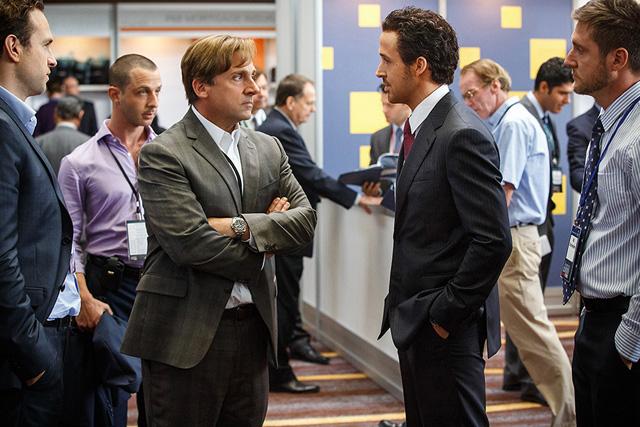It’s funny because it’s true. This is the formula director Adam McKay has successfully used for comedy classics like “Anchorman,” “Talledega Nights” and “Step Brothers.” McKay is a genius at creating outrageous characters and putting them in equally outrageous situations. However, with his latest film, “The Big Short,” McKay takes the opposite route with a film that will make audiences angry because it is, in fact, true.
The movie is based on an adaptation of author Michael Lewis’ bestselling book, The Big Short: Inside the Doomsday Machine. The story chronicles a chain of events that led to the 2008 financial crisis, with key characters helpless to stop it and others that made off like bank bandits.
While it can be difficult to adapt a non-fiction book into a mainstream movie, Lewis has proven his writing style can successfully make the jump from print to the big screen. One of his successes was “Moneyball,” which was directed by Bennett Miller and was nominated for six Oscars. Perhaps inspired by its success, McKay chose to take a dramatic turn from his normal comedic fare and produce an engaging and thoroughly entertaining adaption of true events.
Part of the reason “Moneyball” was so successful was that it took a simplified and condensed approach to the narration of the book it’s based on. It focuses in on the essential characters and important plot points. McKay does a credible job of following a similar formula with “The Big Short,” and the result is a script that is fast-paced and hard-hitting. Perhaps McKay’s biggest success is simply the star-studded cast he was able to attract.
Christian Bale, Ryan Gosling, Steve Carrell and Brad Pitt headline an all-star cast, but it’s the true and shocking plotline of unabashed corruption and greed that will maintain audience interest. The story follows a discovery by stockbroker Michael Burry (Bale), who is a savant when it comes to crunching numbers and looking for trends. What he finds is a fraudulent system set up by banks holding thousands of subprime loans that are creating a bubble that is literally about to burst. Burry is savvy enough to see what is about to happen and decides to take advantage of the situation by essentially betting against the housing market.
This sort of daredevil investing attracts the attention of a smug, foul-mouthed banker, Jared Vennett (Gosling), who, along with hedge funder Mark Baum (Carell), go into the business of profiting from the impending catastrophe by trying to short the market. While they are soberly reminded at times by hipster guru Ben Rickert (Pitt) that millions of people will lose their homes and hard-earned money, it’s hard at first for them to not want to revel in their good fortune by being able to pull a fast one on the big banks.
What starts off as a Wall Street version of “Ocean’s Eleven,” where we are rooting for the underdogs to take out the big bad rich guys, eventually turns to a stark reality that what is unfolding on the screen is not fiction but fact. The end result is a film that will leave you bitter and disgusted at the events portrayed and, even worse, will leave you feeling more aware of the powerful. There is nothing funny about “The Big Short,” but therein lies the reason people should go see it.


